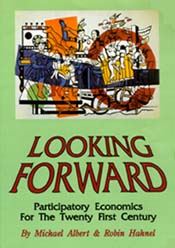
Looking
Forward
By Michael Albert and Robin Hahnel
Web design, scanning, and preparation by Jens Nielsen
Graphics by Matt WuerkerPlease Note: The chapters of Looking Forward were prepared for web viewing assuming a resolution of 800-600 or higher. If you use less, the width of pages will be very distracting...

Looking Forward describes how work could be organized efficiently and productively without hierarchy; how consumption could be fulfilling and equitable; and how participatory planning could promote solidarity and foster self-management while still "getting the job done." Looking Forward offers a practical and humane vision for a truly participatory economy.
Available from South End Press.
About the Parecon Site / ParEcon Q&A / ParEconEssays / CapVsParecon / ParEcon Cmts / ParEconCourses / ParEcon Bks/Vids / Links
Looking Forward
Table of Contents
Click any chapter or section head below to see it in html
with graphics and text as in the print version
Prologue
This brief bit of front matter situates the book in terms of other approaches to post capitalist economic organization and movement and attitudes to them prevalent in 1990, at the time of writing. It provides a succinct critique of marxism Leninism and associated visions...that was more relevant in 1990 than it is today. The sections are:
What is to
come...explaining the structure of the book...values and norms chapters followed
by more detailed looks at institutions and hypothetical descriptive daily life
situations and circumstances...and the dialogs included at various points
throughout, which occur between advocates of participatory economy as outlined
in the book, and of capitalism and centrally planned and market socialism..
1.
Work Without Hierarchy
Understanding work, workplace councils, balanced job complexes, and workplace
decision-making, the values and aspirations that guide us, and a dialog
responding to skeptics
2. Participatory Workplaces
Uses three case studies, one built on a real-life experience, the other two
hypothetical; two in developed economies and one in a third world economy; all
contrasted to typical current conditions; to explore in detail the institutions
of work in participatory economic workplaces.
3. Egalitarian Consumption
Looking at consumption, broadly -- consumption norms, councils, and policies,
the values and aims that guide us
4. Participatory Consumption
Uses case studies to
provide details of private and collective consumption institutions in a
participatory economy, including a dialog with skeptics.
5. Allocation Without Hierarchy
Making
the case for and providing the logic of a new type of allocation
system including debunking myths about markets and central planning
and allocation more generally, and clarifying the need for new
valuations, communications, and relations among producers and
consumers--the values that guide our approach to allocation.
6. Participatory Allocation
The institutional details of participatory planning: how it works,
what steps and institutions are involved, motivations and
implications, and a dialog with skeptics.
7. Workplace Decision
Making
Revisits the earlier case studies to give a detailed picture of daily
life concerns, choices, and decision making in participatory economic
workplaces.
8. Consumption Planning
The nitty gritty of the individual consumer and consumer council's
relation to the planning process, producers, and their own needs and
aspirations...daily life described.
9. Allocation
Decision Making
A last very close look at participatory planning, entering further
into the mechanics and logic and implications.
10. The Information Society
An odd chapter looking at the logic of technology per se and the role
of computers and communications in various economies, particularly
parecon.
11. Conclusion and Transition
We don't live by economics alone...but, rather, an economic vision
must mesh with and foster values we aspire to in other sides of life
as well...plus broad discussion of strategies for attaining a
participatory economy.